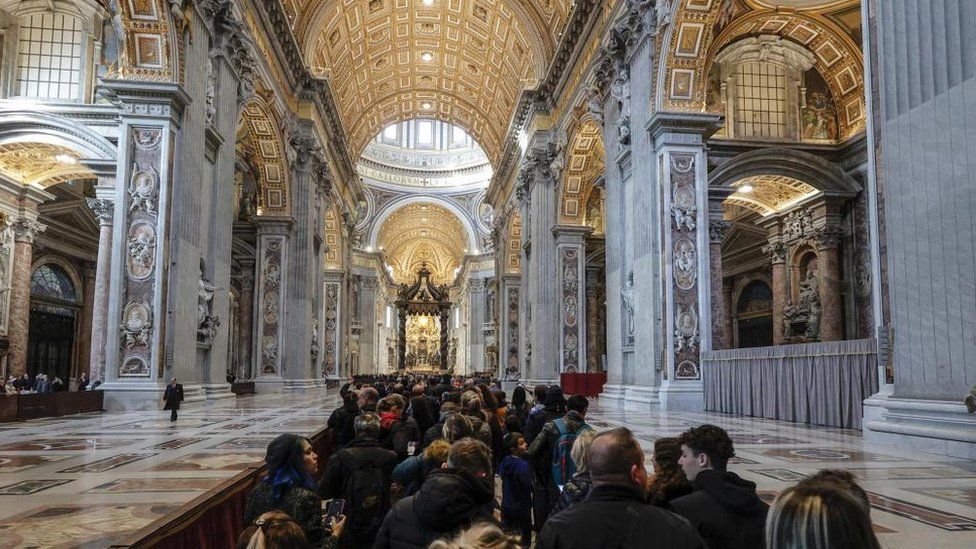
People paid their respects in St Peter’s Basilica
Almost 200,000 people paid homage to former Pope Benedict XVI during his lying in state over the last three days, the Vatican says.
His body has been sealed in a coffin ahead of his funeral on Thursday.
Pope Francis will preside over the funeral – the first time a sitting Pope has led his predecessor’s funeral in over 220 years, the Vatican says.
The former Pope died on New Year’s Eve at the age of 95, almost a decade after standing down because of ill-health.
Tens of thousands of people are expected to attend the funeral in St Peter’s Square, in front of St Peter’s Basilica, at 9:30 local time (8:30 GMT).
The event will be marked by simplicity, in line with what Benedict had asked for, the Vatican says.
Watch: Pope Francis expresses thanks for the life and service of Benedict XVI
Because Benedict was no longer a head of state when he died, only official delegations from Italy and Benedict’s native Germany will attend.
Other leaders will be there in unofficial capacities – including King Philippe of Belgium and Queen Letizia of Spain, as well as the leaders of Poland and Hungary, the Catholic news agency reports.
The Pope Emeritus will be laid to rest in the tombs beneath the Basilica – where more than 90 pontiffs are buried – according to his final wishes.
Before being laid in the crypt, his body will be sealed in a zinc coffin, which will then be put in a wooden case. Items symbolising his time in the papacy will also be placed alongside his body.
A day of national mourning has been declared in Portugal, while in Italy flags will be flown at half-mast on public buildings throughout the country.
Church bells will ring at 11:00 in Germany (10:00 GMT) to commemorate the German-born former Pope’s memory.
Pope Benedict was a powerful presence
In 2013, Benedict became the first Pope in more than 600 years to step down.
But he was still a “powerful presence” in the Vatican after his retirement, according to the most senior British figure there, Archbishop Paul Gallagher.
Observers of Vatican affairs suggest that whether Benedict courted it or not, he became something of a lightning rod for internal criticism of Pope Francis.
“Obviously there have been, in the Church, people who have looked to Benedict to contrast certain decisions that have been made by Pope Francis,” Archbishop Gallagher told the BBC. But he added that the two pontiffs had had an excellent relationship.
Archbishop Gallagher, the Vatican’s foreign secretary, also acknowledged that events of the past week had changed the equation to potentially allow Pope Francis to consider his own retirement more freely.
“If we had three Popes, that would be a little bit difficult to manage. But now that Pope Benedict has gone to the Lord, I think that Pope Francis will stick to those principles that he has established – that he will continue in this ministry as long as he believes that he is capable,” he said, adding that he did not think a decision about stepping down was in any way imminent.
During the past three days of lying in state, mourners travelled from all over the world to pay their respects to the former Pope.
One Catholic pilgrimage organiser who travelled to Rome with his family to pay his respects described the experience of entering the basilica as “beautiful” and “humbling”.
Speaking to the BBC, Mountain Butorac described Benedict as a “very gentle” and “humble” man, who had been like a “papal grandfather” to him.
Image source, EPA
Benedict XVI’s body lay in state in St Peter’s Basilica for public viewing
Image source, EPA
Other mourners paid their respects in their own countries, such as at this Mass in the Dominican Republic
Another mourner, Father Callistus Kahale Kabindama, a priest from Zambia, told Reuters news agency Benedict had been “a great Pope, a marvellous Pope”.
But Benedict was a controversial figure who was criticised by some for failing to adequately tackle allegations of clerical sexual abuse.

